“The Christian order of worship was built up from the Jewish synagogue service of Scripture teaching and prayer with the addition of the distinctively Christian rite of the Lord’s Supper. The latter, too, has antecedents in the Jewish Passover meal and table prayers. The meal became a part of the community assembly of Christians… For many of the Christians, the central point of their Christian experience was this common meal.” ~Everett Ferguson, Early Christians Speak, 1981
Most Bible scholars and careful readers of the texts are unyielding in their convictions that the Lord’s Supper was celebrated in the context of a full meal for the first 300+ years of Christianity. We’ve explored the Biblical witness at length in previous posts. But the post-biblical accounts of early Christian worship only support the earlier writings. Christian communion was established in and shaped by the experience of a common meal. In fact, as argued in this space previously, outside of a common meal the Lord’s Supper loses much of its original function as a practical sign of mutual acceptance and relationship, as a tangible practice of fellowship and unity.
In his instructions “concerning the Eucharist,” the author of Didache, written near the turn of that second century, advises: “After you are filled (or after you have had enough), give thanks in this way…” One of the prayers mentioned in this passage acknowledges God as the one who “gave food and drink to human beings for their refreshment.” Ferguson says:
“The Eucharist in the Didache (we accept this as an account of the Lord’s Supper) appears to be set in the context of a social meal. This was the usual setting in the early days of the church… The disorders at Corinth were occasioned by the circumstances of a common meal.” ~Early Christians Speak
Consider these other early post-biblical accounts of the Lord’s Meal:
“We take the sacrament of the Eucharist, which was commanded by the Lord at meal time and for all alike, in congregations before daybreak.” ~Tertullian, On the Crown (3.3) 190 AD
“…when they sang in alternate verses a hymn to Christ, as to a god, and bound themselves by a solemn oath… after which it was their custom to separate, and then reassemble to partake of food — but food of an ordinary and innocent kind.” ~Pliny, Letters (10.6) addressed to the Emperor Trajan, 112 AD
“Since it is a religious duty, it permits nothing vile, nothing immodest. We do not recline at the table before prayer to God is first tasted. We eat the amount that satisfies the hungry; we drink as much as is beneficial to the modest. We satisfy ourselves…” ~Justin, Apology I, 67, 151 AD
“Let each of those of you who are present take a cup and give thanks and drink, and so take your meal being purified in this way… But when you eat and drink do it in good order and not unto drunkenness, and not so that any one may mock you.” ~Hipploytus, Apostolic Tradition (25) 230 AD
In reviewing these primary source documents, two things are clear: 1) the Lord’s Supper was practiced and understood as a full meal eaten with a community of disciples, and 2) there was much more diversity than uniformity in the ways those meals were celebrated. There were no set liturgies, no standard forms. It was a meal that in structure and frequency reflected the particular place and time in which it was enjoyed. Another thing that becomes clear in writings from the fourth century and later is that, for a variety of reasons, the meal itself began to be scaled down. Also, the bread and cup rituals began to be separated from the meal into two different ceremonies. You can even find in Cyprian and Tertullian as early as the middle of the third century a Eucharist service of bread and wine on Sunday mornings and an Agape Meal, or Love Feast, with the church together on Sunday evenings.
Again, there are many reasons for this significant shift. Just as in Paul’s letter to the Corinthians and Jude’s short note in the New Testament, there were abuses around the table that needed correcting during those first centuries. Counter to the New Testament’s instructions, instead of correcting the abuses, a lot of churches simply did away with the meals altogether. Periodic curfews and bans imposed by the Roman government disrupted the normal meeting routines of the Christians. Persecution halted some of the bigger social meals. A lot of the meals were stopped altogether because of the social and government pressure placed on those who attended them. Early Christians were charged with cannibalism for claiming to eat and drink “flesh and blood.” They suffered suspicion of incest because of their language (“brothers and sisters”) and their bizarre practices (“holy kiss” and “kiss of peace”). The dinners were viewed by most outsiders as an attack of the social structures of the Roman Empire. The mixing of classes and genders was a threat to the civil structures of the day and were seen as disruptive to society. It was certainly easier for the Christians to just stop eating together. So, even then, culture influenced the church in damaging ways. Full meal communion services are mentioned in Christian writings as late as the seventh century. But they inarguably fell from prominence and ceased being the norm after the 300s.
Naturally, there is a world of difference between fellowshipping around a full common meal at somebody’s house and hurriedly rushing through a ritualistic ceremony at a church building on the way to work. Losing the full meal context and practice of the Lord’s Supper was a damaging shift. Much of the symbolism of the table was lost. The easy and informal mood of the celebration was replaced by a more structured and formal ceremony. What else do we lose when the Lord’s Meal is a crumb and a sip instead of “eating to your fill?” How does the method of the meal become the message? By that I mean what is communicated differently? What gets left out? It’s no little thing that, for centuries now, God’s Church has opted out of the full meal in exchange for a ceremonial snack. What makes it more destructive to our Christian practice and Christian message is the mood and atmosphere of our solemn snack. I’ll explore that development in a post tomorrow.
Peace,
Allan
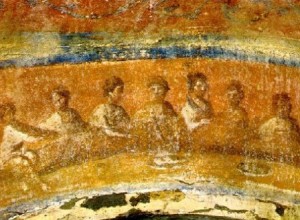
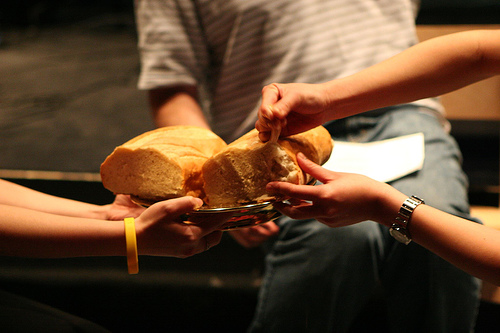
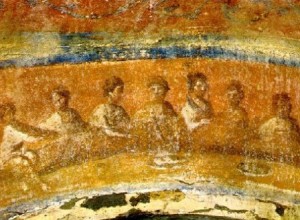
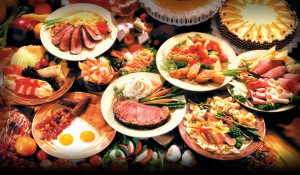

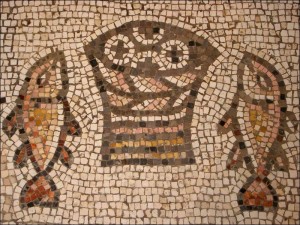
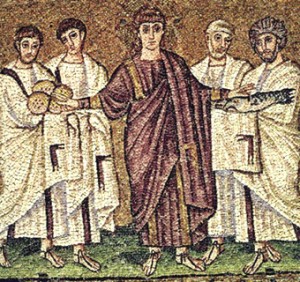
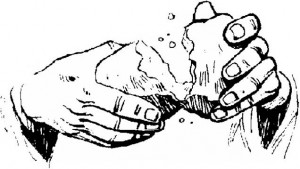
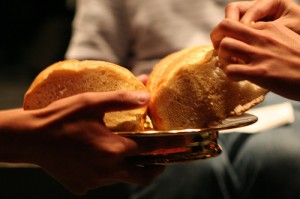
Recent Comments